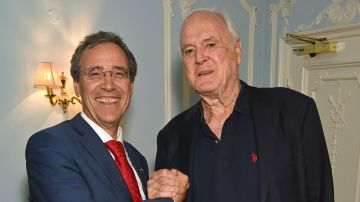Don’t mention Fawlty Towers to the Germans? Why ever not, replies the ambassador.
Miguel Berger has confirmed his appreciation of John Cleese’s humour, and says that contrary to perceptions, his country’s citizens found the infamous episode entitled “The Germans” funny.
Berger, who has been ambassador to the UK for two years, was speaking after watching Cleese’s new West End stage adaptation of the 1970s sitcom. He also met Cleese, who has waxed lyrical about the warm reception he has received from German audiences.
Berger told The Times that he had reacted “positively” to the scenes where the concussed hotel owner, Basil Fawlty, riles German guests with a series of comments about the Second World War despite continually saying: “Don’t mention the war.”
“In the end it is the British Fawlty who is struggling how to deal with these Germans. This is laughing about the awkwardness of the situation and also laughing about the Brits themselves. This is what we like about his type of humour,” the ambassador said.
Advertisement
“What we get upset about are the times Germans are portrayed as dumb Nazis and things like that. But this is nothing like this.”
He said the Fawlty Towers humour was “totally different” to some of the anti-German songs he fears English football followers will sing this summer at the European Championships in Germany. “There the intention is to provoke, to humiliate.”
Berger, who has more than 30 years of diplomatic service, also said that contrary to perception there were a lot of similarities between British and German humour. He cited his country’s love of Ricky Gervais when “he makes fun of all these actors” during the comedian’s presentation of awards shows.
“Germans like British humour. It is a tough humour. But there is a big group who connect to this dark British humour.”
Berger said the attitudes of British people towards Germany — which is explored in Fawlty Towers, set in the 1970s — had changed during the past two decades.
Advertisement
“I think the relationship between Britain and Germany has definitely matured. It is a generational change that has taken place,” he told The Times from the German embassy in Belgrave Square.
“If I hear what my colleagues said 15-20 years ago when there was always this connection to the war, that has changed fundamentally, and also when I speak to German people who told me how difficult it was to grow up here in the 1950s, 1960s — all of that has totally gone.”
Berger makes clear that there is still progress to be made on the political relationship between Germany and Britain, although he stresses that there has been a welcome “shift towards pragmatism in the post-Brexit relationship” under Rishi Sunak, the prime minister.
“The fact that the UK has a pragmatic PM, who just visited Berlin and who was willing to engage with the EU on the Windsor framework and the research programme Horizon, was important,” Berger said.
“I think it also had to do with the geopolitical changes, the rise of China, the war in Ukraine and the fact that many people understood what really mattered and what not … as democracies we are all under pressure and we need to work together to guarantee our security.”
Advertisement
However, he added: “Regrettably the debate on irregular migration makes it very difficult to have a serious dialogue on youth mobility, what can we do for artists, what can we do for school exchanges, for all these things which really matter and which are to a large extent the basis of our relations. Here I see a lot of things we can do better in the future, reduce obstacles.”
Berger said there was also scope to expand cultural partnerships, citing Expressionists, the current exhibition at Tate Modern, which is jointly mounted with Munich’s Lenbachhaus.
Although Germany’s cultural spend — the theatre and music sectors alone get about €4.5 billion (£3.9 billion) annually compared with Arts Council England’s budget of about £600 million — is usually regarded enviously by British artistic leaders, Berger said there were advantages and disadvantages to both approaches.
He said German visitors “appreciate that museums in the UK are largely free” while institutions in Britain had to be “more innovative, more creative” in order to attract people to their paid-for exhibitions.
“In the German system you are less under pressure, you can exhibit and showcase art that maybe will not attract the big crowds because you are not totally dependent on selling tickets and finding sponsorship.
Advertisement
“There are advantages, disadvantages in both systems but I like the innovative part here,” he said.






